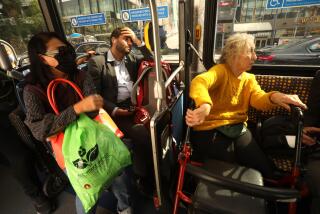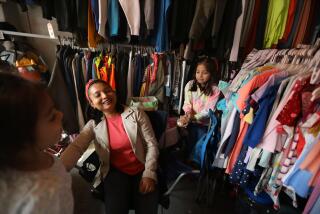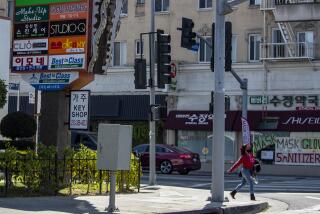Ill Woman Struggles for Her Food, Pride
- Share via
In some ways, Fran Michalski is luckier than most. At least she was injured on the job, so she is eligible for workers’ compensation.
Michalski’s back injury three years ago, as well as ongoing battles with diabetes and psoriasis a nd a history of breast cancer, forced her to leave her job as a registered nurse to pursue a seemingly endless round of medical appointments.
Michalski is 57, lives in Santa Ana, and has no health insurance. As such, she is one of thousands of Orange County residents with no financial net to fall back on when times get tough.
Her travails have brought her to the economic edge where one more misfortune could mean the loss of her car or the apartment she has lived in for nine years. And it has forced her to search out additional help from Orange County’s medical clinics and other programs for the poor.
“I mean I just . . . ,” Michalski says, then begins crying. “I’ve always been one of these who hates to ask. I’ve always given or done (for others). It really hurts when you have to go and beg.”
Once, she said, she went for food stamps when she had only 50 cents in her pocket, “not enough for a quart of milk.” After waiting, and waiting, she was “refused point blank.”
Michalski has been unable to get medical insurance of any substance since she had a double mastectomy 12 years ago because of breast cancer. In this she has a lot of company. According to a study conducted at UCLA’s School of Public Health, more than one-fifth of the adult, non-elderly population in the Anaheim-Santa Ana metropolitan area does not have health insurance, slightly higher than the state average.
In Michalski’s case, workers’ compensation pays her $812 a month, and she receives another $293 in Supplemental Security Income. All told, it is more than many others in similar circumstances.
But by the time she pays $655 a month for rent and nearly $300 for car payments and car insurance, there is little left for anything else, including food. To supplement her income, Michalski collects newspapers and cans to sell at a recycling center.
“The most I ever came back with was $12. I was on cloud nine,” she said.
Michalski has turned to the Share Our Selves (SOS) clinic for help, where she can at least get some of the expensive medications she needs.
“They’ve been wonderful,” Michalski said.
Michalski hurt her back when a male patient at an Orange County free medical clinic where she worked fainted and fell on top of her. After numerous surgeries, and in the face of continuing pain and other back and nerve problems, her doctors say she may never return to work. “I planned on working another 10 or 12 years, if this hadn’t happened,” Michalski said. “But as it is now I can’t stand for very long. I have to lean on my elbows to do the dishes. . . . Just to do ironing last night, if you could see the contortions I go through. It takes me twice as long to do a blouse or a pair of pants than it does anyone else.”
Michalski said that she was “always a hard worker” and that she is shamed by having to ask for help now.
Recalling her humiliation over the food stamp incident she said, “I was serious. I wouldn’t have gone there if I really didn’t need it.”
More to Read
Sign up for Essential California
The most important California stories and recommendations in your inbox every morning.
You may occasionally receive promotional content from the Los Angeles Times.













